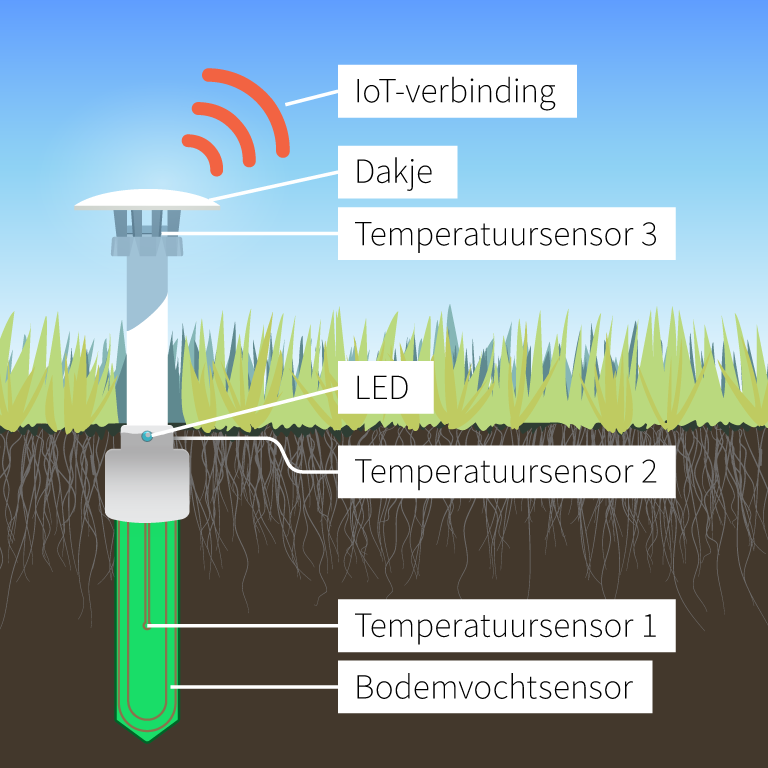Our farmers are among those involved in the unique large-scale citizen survey ‘CurieuzeNeuzen in de Tuin’. With five hundred soil sensors spread across potato fields throughout Flanders, the impact of heat and drought on the cultivation of this typically Belgian crop will be investigated.
As you might have noticed, in recent years, fries have become a little shorter on average. This is a result of the increased summer drought. Because potatoes grow shallow, hot and dry weather soon has an impact on the tubers and thus on the size and quality of the potato harvest. If drought is not sufficiently compensated for by irrigation, this results in smaller potatoes and therefore shorter fries.
Micro-climate in the potato field
The exact impact of heat and drought on the cultivation of potatoes in all its aspects, from the role played by soil type, through the development of pests and diseases, to the effectiveness of crop protection products, is not yet well known. This is why ‘CurieuzeNeuzen in de Tuin’, which will map the heat and drought throughout Flanders for six months with 5,000 soil sensors, offers a unique opportunity for potato cultivators to investigate that impact on their fields.
Using 500 field sensors spread across various potato fields, information is gathered about their micro-climate. The participating fields are spread all across Flanders and were selected in consultation with the Institute for Agricultural, Fisheries and Food Research (ILVO), the inter-provincial Potato Production Research Centre (PCA), INAGRO, the Hooibeekhoeve, Agristo and Clarebout.
Unlike the sensors in gardens, parks, schools and businesses that were placed in early April 2021, the smart soil sensors will be put into the field as of late May, early June 2021. The sensors will accurately measure and record both temperature and soil moisture every 15 minutes – the temperature is determined below as well as above ground. The measurements are automatically uploaded into the WatchITgrow platform via Orange’s Internet of Things channel and forwarded to the University of Antwerp, which is responsible for the scientific coordination and processing of the field measurements along with VITO. ‘In fact, we’re studying the microclimate on the smallest agricultural scale, that of individual potato plants,’ says Bart Deronde of VITO. ‘This gives us a picture, as it were, of how the plants are feeling and how they’re handling the sometimes extreme environmental conditions.’ A look at some recent meteorological tables shows that those conditions are quite considerable.
In April 2020, the average temperature in Belgium was no less than 3 degrees higher than normal, there was barely 40 percent of the normal amount of precipitation and the humidity was also abnormally low. And May 2020 was even warmer and even drier. This endangers Belgian potato growing, because the crops cannot withstand prolonged drought or the combination of humidity and heat. Climate change is thus threatening the survival of a crop that has always done very well, especially in Flanders (thanks to the optimum soil and climate conditions).
The yields from recent years illustrate how serious the impact of heat and drought could be on potato cultivation. ‘In 2018, we had 30 to 40 percent lower yields,’ says Jean-Pierre Van Puymbrouck, Chair of Belpotato, the trade association for the entire Belgian potato chain. ‘In 2019, there was a 5 to 10 percent loss, and last year we lost another 20 percent.’ Moreover, the quality of the potatoes is also compromised. ‘We’ve seen a greater variation in quality in recent years, as well as a higher black spot sensitivity.’ Another problem that has cropped up quite often in recent years is the abnormal formation of shoots and tubers. ‘This is a type of overgrowth that occurs in some varieties, such as the bintje,’ explains Van Puymbrouck. ‘Heat and drought stop growth, after which heavy rainfall (also something that’s become more frequent in recent years) causes growth to resume. As a result, new tubers appear and suck the first tubers dry. The resulting potatoes are characterised by a low underwater weight.’ That weight is a measure of the starch and dry matter content, and thus of quality.
Research for better potato yields
The measurement results from the five hundred sensors will be used for basic research in the first instance. Which potato fields suffer most from drought and heat? And why? What role do the soil characteristics (sand, loam or clay) play in this? ‘We want to answer these type of questions,’ says Anne Gobin of VITO. Belgian potato growers are very interested because they are hoping to achieve higher yields through better information gathering. Gobin: ‘With this research, we can look at how they can better adapt their crops to a warmer and drier future.’ ‘CurieuzeNeuzen in de Tuin’ is an initiative from the University of Antwerp and De Standaard in close collaboration with Rabobank, Orange, VITO, the VMM, the Department of the Economy, Science and Innovation, the Department of the Environment, Bio-Planet, DPD and Aquafin.
STEM teaching packages remote sensing
Projects like ‘CurieuzeNeuzen in de Tuin’ lend themselves perfectly to the educational curriculum. In collaboration with trainee teachers from the Thomas More University of Applied Sciences, De Helix and MOS (the Environment Department’s educational operation) and Klimaatlink, a project from the Global Change Ecology Centre and the University of Antwerp, lesson packages were developed for the first, second and third years of primary education, and for the first and third years of secondary education. They focus on the importance of gardens, parks and other green spaces and the ecosystem services they can provide. These lesson packages are available from the CurieuzeNeuzen website. In collaboration with its educational partner GoodPlanet, VITO is also launching its own STEM teaching module entirely devoted to remote sensing. In this module, third-year secondary school students can discover how VITO translates remote sensing data into information that is useful in various sectors. This module can be taken on-site at VITO in Mol, given online as a teaching assignment or worked through in class under theguidance of a GoodPlanet coach.
Copyright photo: An Van Gijsegem




